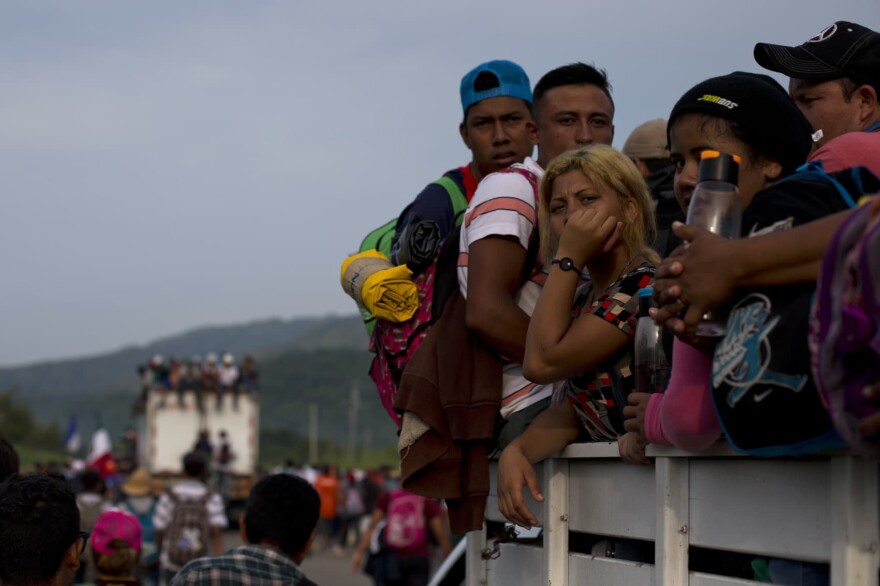With Meghna Chakrabarti
Immigration and the midterms. 5,200 troops head to the border. President Trump threatens to void the birthright citizenship law. Is it a winning strategy for the GOP?
Guests
Stef Kight, immigration and demographics reporter for Axios. (@StefWKight)
Akhil Amar, Sterling Professor of Law at Yale University, where he teaches constitutional law.
Alan Gomez, immigration reporter for USA Today. (@alangomez)
Julián Aguilar, immigration and border security reporter for the Texas Tribune. (@nachoaguilar)
From The Reading List
Axios: “Exclusive: Trump targeting birthright citizenship with executive order” — “President Trump plans to sign an executive order that would remove the right to citizenship for babies of non-citizens and unauthorized immigrants born on U.S. soil, he said yesterday in an exclusive interview for ‘Axios on HBO,’ a new four-part documentary news series debuting on HBO this Sunday at 6:30 p.m. ET/PT.
“Why it matters: This would be the most dramatic move yet in Trump’s hardline immigration campaign, this time targeting ‘anchor babies’ and ‘chain migration.’ And it will set off another stand-off with the courts, as Trump’s power to do this through executive action is debatable to say the least.”
NBC News: “Trump wants to end birthright citizenship with an executive order” — “Many legal scholars believe the issue was settled by an 1898 decision of the U.S. Supreme Court involving a man born in the United States to Chinese parents who lived here legally.
“After a trip abroad, Wong Kim Ark was blocked from re-entering the country on the grounds that he was not a citizen. He fought back and won. By a 6-2 vote, the court said the 14th Amendment applied to virtually everyone born in the U.S., except for children of enemies of the U.S. or of foreign diplomats, or children born on Native American reservations, which were considered sovereign entities.
“Nearly 100 years later, in 1982, the Supreme Court used language that seemed to indicate the protection applied to children of illegal immigrants as well.
“In ruling in Plyler v. Doe, Texas must provide a free public education to undocumented children, the court said in a footnote that ‘no plausible distinction with respect to Fourteenth Amendment “jurisdiction” can be drawn between resident aliens whose entry into the United States was lawful, and resident aliens whose entry was unlawful.’ ”
Texas Tribune: “Texas’ border lawmakers say they’re in the dark on troop deployment” — “Ask a border lawmaker from Texas how much President Donald Trump’s decision to send the military to the U.S.-Mexico border will cost taxpayers, and the response could be a shrug of the shoulders. Same thing goes if they’re asked how long the deployment will last or if it will disrupt cross-border trade and travel.
“A day after federal officials announced that active-duty military will descend on the border to thwart the caravan of Central American asylum-seekers slowly approaching the United States, border lawmakers said they’ve been left in the dark about any further details surrounding the estimated 5,200-troop deployment.”
USA Today: “Far from U.S.-Mexico border, immigration debate dominates many 2018 House races” — “In a recent congressional debate in Idaho, the first 11 questions for a pair of congressional candidates were about immigration. At another in Arkansas, the fate of undocumented immigrant kids dominated the discussion even though few of them reside in the state. And in Minnesota, a Democrat challenging an incumbent GOP House lawmaker went back and forth on the merits of building a wall on the U.S. southern border more than 1,600 miles away.
“With the midterm elections next, the topic of immigration is churning in House congressional races in places where the unemployment rate is low, the economy is robust and undocumented immigrants are few. Historically, these same indicators, when pointing in the opposite direction, trigger an anti-immigrant backlash.”
Copyright 2022 NPR. To see more, visit https://www.npr.org.


